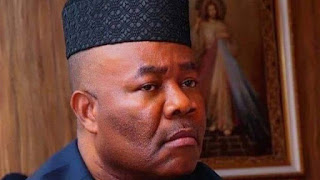Fx rate set by customs for cargo clearance reduced by N124, now standing at N1,448 per US dollar.
- Get link
- Other Apps
The exchange rate charged by the Nigerian Customs Service (NCS) for cargo clearance and import duties collection has dropped significantly from N1,572.5/$ to N1,448.38 to the USD.
This is a reduction of N124.12 from the previous figure.
The new figure reflects the prevailing exchange rate on the CBN’s official window. Nairametrics earlier reported the naira closing at N1431 to the USD at the close of trade last week.
The exchange rate for import duties payment on the customs portal has been on a steady decline in the past two weeks mirroring the strengthening of the naira in the FX market. The exchange rate for cargo clearance peaked at N1,624.7/$1 on March 12, 2024, before the gradual decline to the current figure.
The Nigeria Customs had earlier stated that the exchange rate for cargo clearance will follow the CBN’s official rate.
Implication of recent reforms on exchange rate
The apex bank on the other hand had addressed the frequent changes on the customs exchange rate and the attendant confusion stating that the exchange rate on the date of opening the ‘Form M’ will be used for import duties assessment.
The CBN in recent times has instituted a motley of reforms aimed at stabilising the forex market, dispelling speculations, eradicating distortions and strengthening the value of the naira.
The near parity between the official and parallel market exchange rates signifies the successful implementation of the Central Bank of Nigeria’s (CBN) foreign exchange market reforms in recent times.
CBN’s MPC meeting
This week, the Central Bank will hold its second monthly Monetary Policy Committee (MPC) in 2024 where it would decide to either hold MPR or increase it as part of measures to strengthen the naira and reduce inflation rate across the country.
In its last MPC meeting, the apex bank increased MPR by 400 basis points from 18.75% to 22.75% last month.
The recent drop in the Customs FX rate for cargo clearance to N1,448 per US dollar, representing a decrease of N124, holds significant implications for various stakeholders involved in international trade, including importers, exporters, customs authorities, and the broader Nigerian economy. In this comprehensive explanation, we will delve into the factors contributing to this change, its impact on different sectors, potential drivers behind the decision, and implications for the economy.
1. Understanding the Customs FX Rate:
The Customs FX rate refers to the exchange rate used by customs authorities for the valuation of imported goods during cargo clearance processes. It determines the value of imported goods in Nigerian Naira terms, which is crucial for calculating customs duties, taxes, and other charges levied on imported cargo.
2. Decrease in Customs FX Rate:
The recent decrease in the Customs FX rate from its previous level to N1,448 per US dollar represents a notable adjustment in the valuation of imported goods. This drop of N124 per US dollar indicates a significant shift in the exchange rate dynamics governing international trade transactions involving Nigeria.
3. Implications for Importers and Exporters:
Importers stand to benefit from the decrease in the Customs FX rate as it reduces the cost of clearing imported goods through customs. A lower FX rate means lower valuation of imported goods in Naira terms, leading to reduced customs duties, taxes, and clearance charges for importers.
Conversely, exporters may face challenges due to the depreciation of the Naira against the US dollar. A weaker Naira makes Nigerian exports relatively cheaper in international markets, potentially boosting export competitiveness. However, exporters may also experience higher production costs for imported inputs and face reduced earnings in Naira terms when converting foreign currency proceeds.
4. Impact on Customs Revenue and Government Finances:
The adjustment in the Customs FX rate can have implications for customs revenue collection and government finances. A lower FX rate reduces the valuation of imported goods for customs duty purposes, leading to lower revenue collection from import duties, taxes, and clearance charges.
While importers may benefit from cost savings due to lower customs duties, the government may experience a shortfall in revenue collection, impacting budgetary allocations for public spending and infrastructure development initiatives. However, the potential trade-off between revenue collection and import facilitation may be considered in the context of broader economic objectives and trade policy objectives.
5. Drivers behind the Decision:
Several factors may have contributed to the decision to decrease the Customs FX rate for cargo clearance. These factors could include changes in the foreign exchange market dynamics, government policies aimed at promoting importation and trade facilitation, adjustments in customs valuation methodologies, or efforts to address concerns raised by stakeholders regarding the cost of cargo clearance.
Additionally, macroeconomic considerations such as inflationary pressures, exchange rate stability objectives, and the need to support economic recovery and growth may have influenced the decision-making process. The rationale behind the adjustment in the Customs FX rate may reflect a balancing act between competing policy objectives, including trade facilitation, revenue generation, and macroeconomic stability.
6. Economic and Trade Policy Implications:
The decrease in the Customs FX rate for cargo clearance carries broader economic and trade policy implications for Nigeria. On one hand, it may stimulate import activity, promote trade facilitation, and support economic recovery efforts by reducing the cost of importing goods and raw materials for domestic production.
On the other hand, a lower Customs FX rate may impact domestic industries by increasing competition from imported goods, potentially leading to concerns about import substitution, trade balance dynamics, and the resilience of domestic manufacturing sectors. Policymakers may need to consider the trade-offs between promoting import-led growth and safeguarding domestic industries against external competition.
7. Conclusion:
In conclusion, the recent decrease in the Customs FX rate for cargo clearance to N1,448 per US dollar represents a significant development in Nigeria's international trade landscape. This adjustment holds implications for importers, exporters, customs revenue collection, government finances, economic recovery efforts, and trade policy objectives.
Understanding the drivers behind the decision to decrease the Customs FX rate requires careful consideration of various factors shaping Nigeria's economic and trade environment, including exchange rate dynamics, government policies, macroeconomic considerations, and broader trade policy objectives.
Moving forward, stakeholders will need to monitor the impact of the adjusted Customs FX rate on import and export activities, revenue collection, industry competitiveness, and overall economic performance to inform future policy decisions and ensure sustainable and inclusive economic growth in Nigeria.
- Get link
- Other Apps




Comments
Post a Comment